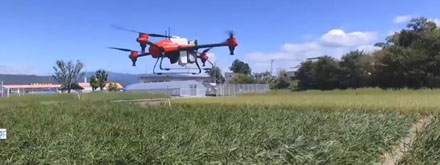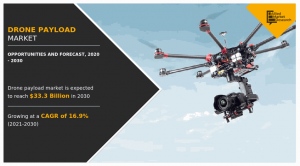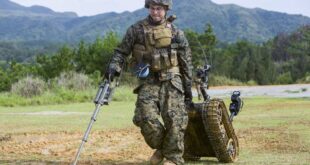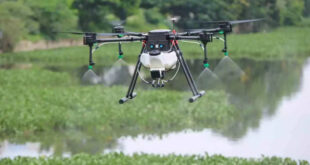Artificial intelligence-driven drone has started revolutionizing Philippines’ rice farming n as Bayer Crop Science (BCS) completed a “drone seeding” demonstration in Paniqui, Tarlac that is significantly eliminating costly and time-consuming labor in rice planting.
A technology demonstration completed by BCS in Brgy. Sampot last November 20 has shown the success of using drone to broadcast (‘sabog tanim’) rice seeds. Sabog tanim or direct seeding is a method of sowing rice seeds.
The drone seeder is being received enthusiastically by Filipino farmers in Central Luzon as it substantially cuts labor and cost of direct seeding. The drone seed spreading service fee is being placed at only P3,000 per hectare for Bayer Arize farmer-customers.
Labor cost for transplanting rice traditionally costs P11,000 to P13,000 per hectare.
Instead of a whole day to do direct seeding in one hectare, drone seeding for the same area can be completed in only 30 minutes. Based on the conducted trial, seeding rate is 20 to 25 kilos of hybrid rice seeds per hectare, which is far less than the 40-50 kilos seeding rate in the manual sabog tanim, indicating effective seed distribution.
“We are preparing farmers for a complete package of smart technology. We can now use the drones to support agriculture modernization. Other countries in Southeast Asia have started to use drones in farming, including Thailand, Indonesia, and Vietnam. Meanwhile, It’s already used extensively in China,” said Aaron Cano, BCS new business activation manager during the technology demonstration. “This is the future of farming. We are opening an opportunity for the youth to get interested in farming.”
BCS has started setting up a “one-stop-shop” for farmers to bring a complete service of hardware, apps, and inputs—high yielding Arize hybrid rice seeds and crop protection products.
“We’re developing that model right now—a complete service that goes beyong distribution of farm inputs. Down the road, we’ll also look at other hardware and applications that collect relevant data on climate, weather, and plant health to be provided regularly to farmers,” said Cano.
New Hope Corp. (NHC) Founder/Director Anthony Tan said NHC, which distributes drones in the Philippines, has already been licensed by the Fertilizer and Pesticide Authority (FPA) to use drones for spraying application. However, approvals for specific crop protection products that can be applied using drones have yet to be realized. This is where BCS is working to ensure regulatory compliance with FPA guidelines for priority products and crops.
A sprayer, much as the broadcaster, is an attachment of the drone that enables farmers to conveniently spray pesticides or other granulated materials on their plants.
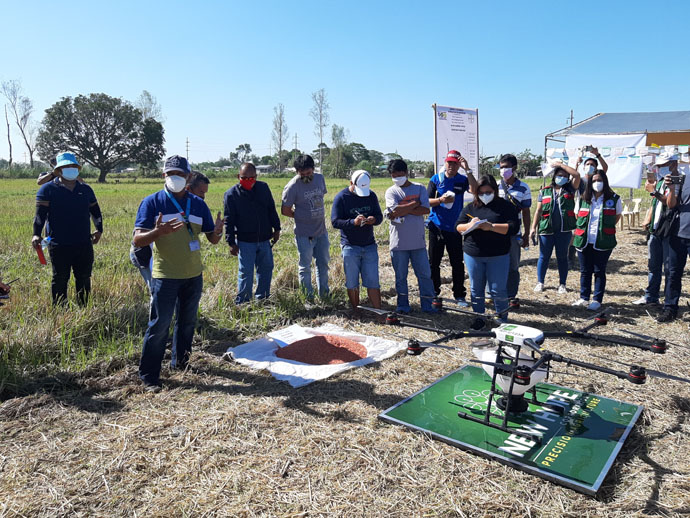
The Department of Agriculture (DA), particularly Region 3 under Director Crispulo G. Bautista, has already adopted a drone technology program. “We are scheduled to have a technology demonstration in mid-December in Candaba, Pampanga. We are also providing other venues for demo. Those who want to request us to hold demo in their place may just contact us,” said Shiela Hipolito DA Region 3 Rice Program Manager.
Cano added that BCS is introducing a web-based app called Agrolink. Bayer Arize rice seeds users just have to sign up an account to access Agrolink. Through this integrated Smart Farming program, farmers are given points from purchases that they can acculmuate to get discounts and likely include the drone services.
“All the data we’re going to get will be part of an integrated agriculture—a complete, integrated solution for smallholder farmers is what we’re aiming for to boost their yields and incomes,” said Cano.
For now, Tan said the drone’s seed broadcasting service will initially be carried out in partnership with Bayer’s Arize seeds. “We’ve been successful in testing the technology with Bayer’s Arize rice seeds. We find comfort in this partnership since we have been testing this for two years,” Tan said.
“Any new technology goes through trial and error stage,” Tan added. “That is what the drone technology has hurdled under the partnership between NHC and BCS. The collaboration successfully proved that Arize hybrid seeds can be utilized efficiently using drones in certain soil types.
First, farmers have to prepare Arize hybrid rice seeds by soaking in water for 12 to 18 hours with Gaucho seed treatment. Next, the seeds are incubated for 18 hours. Afterwards, the rice seeds are loaded on drones for aerial distribution and seeding. The seeds shouldn’t have shoots so it can freely be dropped to the soil by the drone. Seed treatment with Gaucho prevents birds and other pests like preying on the seeds for up to 30 days.
The drone, registered with the Civil Aviation Authority of the PHilippines (CAAP), has a weight of 25 kilos and a rice seed loading capacity of 10 kilos. Drone pilots are also registered by CAAP.
Good seeding has also been observed when land preparation has been done properly. For now, the introduction of the drone seeding service will be focused in Central Luzon, Philippines’ rice granary.
“We want to put farmers at ease with the technology. A lot of farmers in Iloilo have been pressing us on the supply of the drones, but these have to be scheduled,” Tan said. While direct seeding has been known to be less productive than transplanting (producing seedling first then transferring these to permanent locations), transplanting is laborious, costlier, and takes a longer time to complete.
“You can’t expect different results from doing the same thing. With drones, we do things very differently. First, the seeds should be quality seeds. The choice of farmer is to transplant hybrid seeds, but now, there’s a new hope with Bayer’s proposition on automated drone technology,” said Tan.
Within just one day, 20 hectares may be planted with the seeds using drones versus 1 hectare if done manually. The drone distributes rice seeds aerially from an altitude of 2.5 meters at a speed of one meter per second.
As a single drone would cost around P1 million which are out of reach for most farmers, NHC plans to provide the service at a reasonable fee for farmers within selected communities.
The Tarlac government is also supporting the supply of drones to its farmers. “Rep. Charlie Cojuangco wants average rice yield of Tarlac farmers to increase to more than five tons per hectare. We just finished just one techno-demo first, and maybe we will add more techno demos to introduce the technology to farmers,” said Ar-ar Molic, Carlos O. Cojuangco Foundation project manager.
SIGN UP TO DAILY NEWSLETTER
CLICK HERE TO SIGN-UP
 Unmanned Aerial Vehicle The latest drone news
Unmanned Aerial Vehicle The latest drone news
